Related Research Articles

Organic farming, also known as ecological farming or biological farming, is an agricultural system that uses fertilizers of organic origin such as compost manure, green manure, and bone meal and places emphasis on techniques such as crop rotation and companion planting. It originated early in the 20th century in reaction to rapidly changing farming practices. Certified organic agriculture accounts for 70 million hectares globally, with over half of that total in Australia. Biological pest control, mixed cropping, and the fostering of insect predators are encouraged. Organic standards are designed to allow the use of naturally-occurring substances while prohibiting or strictly limiting synthetic substances. For instance, naturally-occurring pesticides such as pyrethrin are permitted, while synthetic fertilizers and pesticides are generally prohibited. Synthetic substances that are allowed include, for example, copper sulfate, elemental sulfur, and veterinary drugs. Genetically modified organisms, nanomaterials, human sewage sludge, plant growth regulators, hormones, and antibiotic use in livestock husbandry are prohibited. Organic farming advocates claim advantages in sustainability, openness, self-sufficiency, autonomy and independence, health, food security, and food safety.

Patidar, formerly known as Kanbi, is an Indian land-owning and peasant caste and community native to Gujarat. The community comprises at multiple subcastes, most prominently the Levas and Kadvas. They form one of the dominant castes in Gujarat. The title of Patidar originally conferred to the land owning aristocratic class of Gujarati Kanbis; however, it was later applied en masse to the entirety of the Kanbi population who lay claim to a land owning identity, partly as a result of land reforms during the British Raj.

Traditional farming was the original type of agriculture, and has been practiced for thousands of years. All traditional farming is now considered to be "organic farming" although at the time there were no known inorganic methods. For example, forest gardening, a fully organic food production system which dates from prehistoric times, is thought to be the world's oldest and most resilient agroecosystem. The industrial revolution introduced inorganic methods, most of which were not well developed and had serious side effects. An organic movement began in the 1940s as a reaction to agriculture's growing reliance on synthetic fertilizers and pesticides. The history of this modern revival of organic farming dates back to the first half of the 20th century at a time when there was a growing reliance on these new synthetic, non-organic methods.
Unjha is a town and a municipality in the Mehsana district of the Indian state of Gujarat. Unjha is 26 km north of Mehsana and 102 km north of Ahmedabad.
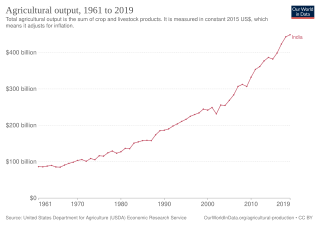
The history of agriculture in India dates back to the Neolithic period. India ranks second worldwide in farm outputs. As per the Indian economic survey 2020 -21, agriculture employed more than 50% of the Indian workforce and contributed 20.2% to the country's GDP.
The Gurjar are an Indo-Aryan agricultural ethnic community, residing mainly in India, Pakistan and Afghanistan, divided internally into various clan groups. They were traditionally involved in agriculture, pastoral and nomadic activities and formed a large heterogeneous group. The historical role of Gurjars has been quite diverse in society: at one end they have been founders of several kingdoms and dynasties and, at the other end, some are still nomads with no land of their own.
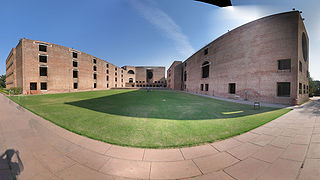
Gujarat is a state situated in the western part of India and shares its northwestern boundary with Pakistan. Rajasthan, Madhya Pradesh and Maharashtra are the neighboring states of Gujarat. Gandhinagar is the capital city of the state and Ahmedabad is its largest city and the main commercial hub of the region. Gujarat houses a wide variety of industries and is considered one among the best industrialized states of the nation. Gujarat is also home to some of the prestigious educational institutes of the nation.

Suminter India Organics is a privately held multinational supplier of certified organic products from India to Europe and the United States. Founded in 2003, Suminter's mission is to give small-scale Indian farmers access to a global $52bn marketplace for certified organic products. In 2016, Suminter was working with over 20,000 farmers in Gujarat, Maharashtra, Kerala, Uttarakhand, and Rajasthan, covering 110,000 acres (450 km2) of land under organic cultivation. The company focuses on two product lines: non-perishable organic food and organic cotton.

Natural farming, also referred to as "the Fukuoka Method", "the natural way of farming", or "do-nothing farming", is an ecological farming approach established by Masanobu Fukuoka (1913–2008). Fukuoka, a Japanese farmer and philosopher, introduced the term in his 1975 book The One-Straw Revolution. The title refers not to lack of effort, but to the avoidance of manufactured inputs and equipment. Natural farming is related to fertility farming, organic farming, sustainable agriculture, agroecology, agroforestry, ecoagriculture and permaculture, but should be distinguished from biodynamic agriculture.

Farming systems in India are strategically utilized, according to the locations where they are most suitable. The farming systems that significantly contribute to the agriculture of India are subsistence farming, organic farming, industrial farming. Regions throughout India differ in types of farming they use; some are based on horticulture, ley farming, agroforestry, and many more. Due to India's geographical location, certain parts experience different climates, thus affecting each region's agricultural productivity differently. India is very dependent on its monsoon cycle for large crop yields. India's agriculture has an extensive background which goes back to at least 9 thousand years. In India, in the alluvial plains of the Indus River in Pakistan, the old cities of Mohenjo-Daro and Harappa experienced an apparent establishment of an organized farming urban culture. That society, known as the Harappan or Indus civilization, flourished until shortly after 4000 BP; it was much more comprehensive than those of Egypt or Babylonia and appeared earlier than analogous societies in northern China. Currently, the country holds the second position in agricultural production in the world. In 2007, agriculture and other industries made up more than 16% of India's GDP. Despite the steady decline in agriculture's contribution to the country's GDP, agriculture is the biggest industry in the country and plays a key role in the socio-economic growth of the country. India is the second-largest producer of wheat, rice, cotton, sugarcane, silk, groundnuts, and dozens more. It is also the second biggest harvester of vegetables and fruit, representing 8.6% and 10.9% of overall production, respectively. The major fruits produced by India are mangoes, papayas, sapota, and bananas. India also has the biggest number of livestock in the world, holding 281 million. In 2008, the country housed the second largest number of cattle in the world with 175 million.

The Koli is an Indian caste found in Rajasthan, Himachal Pradesh, Gujarat, Maharashtra, Uttar Pradesh, Haryana, Karnataka, Odisha and Jammu and Kashmir states in India. Koli is an agriculturist caste of Gujarat but in coastal areas they also work as fishermen along with agriculture. In the beginning of 20th century, the Koli caste was recognised as a denotified tribe under Criminal Tribes Act by the Indian Government because of their anti-social activities during World War I.

Gajendra Singh Shekhawat is an Indian politician who is serving as Minister of Culture and Minister of Tourism since 2024. He is a member of parliament from the Bharatiya Janata Party (BJP) representing Jodhpur in the Lok Sabha.
Ram Saran Verma is an Indian farmer recognized for introducing advanced and more profitable farming techniques to small Indian farmers and rural villages in his state. Verma has received numerous Indian farming awards for his work, and his farming techniques have been studied and replicated across his state. In 2019, he was honored India's fourth highest civilian award, the Padma Shri.
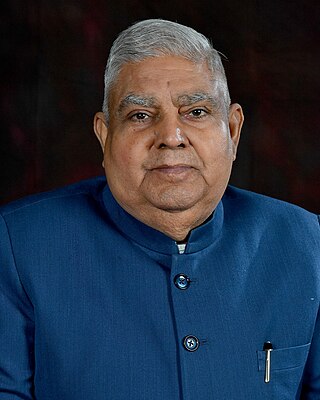
Jagdeep Dhankhar is an Indian politician and lawyer, serving as the 14th and current vice president of India since 2022. He previously served as the Governor of West Bengal from 2019 to 2022. He also served as a Union Minister of State for Parliamentary Affairs in the Chandra Shekhar ministry from 1990 to 1991. He was a member of Lok Sabha from 1989 to 1991 and later a Member of Rajasthan Legislative Assembly from 1993 to 1998. He has also been affiliated with multiple political parties in India, including the Bharatiya Janata Party, Indian National Congress and Janata Dal.

Ruma Devi, is an Indian social worker, fashion designer and traditional handicraft artist from Barmer, Rajasthan. Ruma devi received the “Nari Shakti Puraskar 2018” the highest civilian honour for Women in India. She is associated with a network of over 30,000 rural women, trained them and linked them to the livelihood.
Sundaram Verma is an Indian environmentalist. He was awarded Padma Shri, India's fourth-highest civilian award in 2020, for developing the agricultural technique called ‘dryland agroforestry' which was developed to help tree plantation efforts in arid regions of India.

The Indian agriculture acts of 2020, often termed the Farm Bills, were three acts initiated by the Parliament of India in September 2020. The Lok Sabha approved the bills on 17 September 2020 and the Rajya Sabha on 20 September 2020. The President of India, Ram Nath Kovind, gave his assent on 27 September 2020.
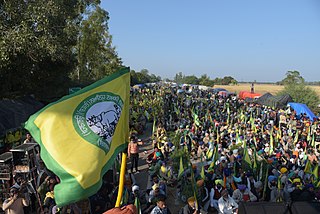
The 2020–2021 Indian farmers' protest was a protest against three farm acts that were passed by the Parliament of India in September 2020. The acts, often called the Farm Bills, had been described as "anti-farmer laws" by many farmer unions, and politicians from the opposition who said that it would leave farmers at the "mercy of corporates" since the farmer-trader disputes were taken to SDM instead of judiciary. The protests demanded the creation of a minimum support price (MSP) bill, to ensure that corporates cannot control the prices. The Union Government, however, maintained that the laws would make it effortless for farmers to sell their produce directly to big buyers, and stated that the protests are based on misinformation. Related endemic legacy issues include farmer suicides and low farmer incomes. Despite India being largely self-sufficient in foodgrain production and having welfare schemes, hunger and nutrition remain serious issues, with India ranking as one of the worst countries in the world in food security parameters. Due to unfulfilled previous demands 2024 Indian farmers' protest started on 13 of February 2024.
Olive production in India is concentrated in the state of Rajasthan. Olives are not native to India. Olive production in the country began in 2007 when olive saplings were imported from Israel and planted in the Thar Desert. The first olive yield in India occurred in 2012, and commercial olive oil production began in September 2013. The first Indian-made olive oil brand called Raj Oil was launched on 9 November 2016. India produced 150 tonnes of olives in 2020.
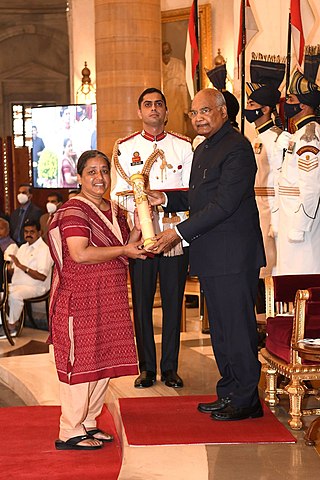
Sabarmatee is an Indian conservationist and farmer living in Nayagarh district in the state of Odisha. She works with a non-governmental organization called Sambhav which was visualised by her father Padma Shri Prof Radhamohan that promotes organic farming and conservation of indigenous varieties besides doing many other activities. The achievements of Sabarmatee were recognised in 2018, when she received the Nari Shakti Puraskar and in 2020 with the Padma Shri.
References
- ↑ "Rajasthan: School dropout turned farmer to design course for nation's agricultural universities | Jaipur News - Times of India". The Times of India. TNN. Jan 18, 2022. Retrieved 2022-07-16.
- ↑ "The organic farming champion of Rajasthan exporting produce to Europe". Hindustan Times. 2019-03-28. Retrieved 2022-07-16.
- ↑ Saxena, Akanksha (2022-01-18). "Skills Over Degree! School Dropout From Rajasthan Set To Design Syllabus For Agricultural Universities". thelogicalindian.com. Retrieved 2022-07-16.
- ↑ "Skill over Education: School dropout from Rajasthan to design new syllabus for Agriculture Universities". www.timesnownews.com. Retrieved 2022-07-16.